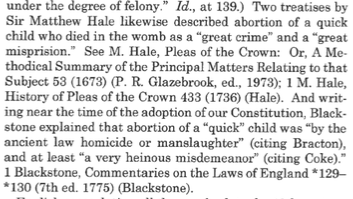Roe and the Right to Privacy
On Monday, May 2nd, the news organization Politico released a draft of a Supreme Court decision written by Justice Samuel Alito, revealing that the court had voted to repeal the 1973 decision Roe v. Wade. Chief Justice John Roberts later confirmed the document as legitimate but said that the document is not a representation of a final decision. Roe v. Wade was called into question again due to a case currently being debated by the Supreme Court, Dobbs v. Jackson Women’s Health Organization, regarding Mississippi’s ban on abortion after 15 weeks.
By overturning Roe, the decision of if or when to ban abortion falls to the states instead of having a federal baseline, meaning that some states could ban abortion completely, with no emergency health exceptions, while other states will maintain the laws they currently have.
Roe v. Wade was a landmark decision of the Supreme Court which declared that women have the right to access abortion without excessive government restrictions. A key part of the Roe decision was the Due Process clause of the Fourteenth Amendment of the United States Constitution. The ruling stated that this clause provides a “right to privacy,” that protects a person’s right to access abortion without interference. Roe originally granted abortion access based on a trimester system, where abortion was entirely unrestricted in the first trimester of pregnancy, could be “reasonably restricted” in the second trimester and could be prohibited entirely in the third trimester, provided there were exceptions when it was necessary for the life or health of the mother.
The decision was revisited with the 1992 case Planned Parenthood v. Casey, where the right to access abortion was upheld, but changed the trimester system in favor of using fetal viability as a deciding factor. Viability is the term used to describe a fetus’s ability to survive outside the womb, which allowed for varying interpretations of how this decision should be implemented. The Casey decision also stated that any restriction on the abortion of unviable fetuses would be unconstitutional. Although abortion rights in the United States have been routinely challenged, this is the first time that the Supreme Court has shown such commitment to overturning the decision.
In order to fully understand Justice Alito’s reasoning, you need to understand the way in which he interprets the Constitution. Alito is a proponent of Originalism, a form of interpreting the Constitution based on the original understanding at the time it was adopted. Alito is approaching the question of abortion from the perspective of a man in 1788 (when the Constitution was ratified), and 1868 (when the Fourteenth Amendment was ratified).
In the draft decision, Justice Samuel Alito supports restricting abortion on the basis that there is no constitutional basis for either the Roe or Casey decision. “Even though the Constitution makes no mention of abortion, the Court held that it confers a broad right to obtain one.” “The Constitution makes no reference to abortion, and no such right is implicitly protected by any constitutional provision, including the one on which the defenders of Roe and Casey now chiefly rely- the Due Process Clause of the Fourteenth Amendment. That provision has been held to guarantee some rights that are not mentioned in the Constitution, but any such right must be ‘deeply rooted in this Nation’s history and tradition’ and ‘implicit in the concept of ordered liberty.'”

Alito also claims that abortion is not a guaranteed right within the United States since there is no historical legal precedent for the right. “The inescapable conclusion is that a right to abortion is not deeply rooted in the Nation’s history and traditions.” “Until the latter part of the 20th century, such a right was unknown in American law.”
The implications of Alito’s argument is that many of the civil rights we experience today (interracial marriage, gay marriage, women’s social and economic freedom) could be considered practices “not deeply rooted in America’s history and laws.” The Civil Rights Act, which ended segregation, was passed in 1964. While it may seem like history to younger people, there are many in this country that remember when the act was passed. There are many in this country who lived under segregation before the bill and are still alive today. It could be argued that when comparing the years that segregation has been illegal to the time black people were considered second-class citizens, there is no historical precedent for the Civil Rights Act. This is the kind of rhetoric that Alito is using, and it becomes even more worrying when people start using the same reasoning to justify taking away other rights.

Alito cites “an unbroken tradition of prohibiting abortion on pain of criminal punishment”, and notes Sir Matthew Hale as an example.

Sir Nathan Hale became Lord Chief Justice of England in 1671. Like many men of his time, Hale believed that women’s bodies were the property of men. Be it their fathers or husbands, the key focus is that women were not seen as autonomous beings. The laws at Hale’s time were based on common law (laws based on previous precedents), Roman law (the inspiration behind today’s civil law), and biblical law. Hale believed that women were made from Adam’s rib, and were simply extensions of men, to exist only as a means of assistance to men instead of independent, conscious beings.
Hale is a questionable source to use as justification, especially when looking at his writings beyond abortion. In History of Pleas of the Crown (Historia Placitorum Coronae), which Alito references by name in his opinion, Hale argues that marital rape was entirely legal, going even further to say that since men owned women’s bodies, and that women were simply extensions of the men that owned them, men were in fact incapable of marital rape. The logic here is that you can’t violate something that isn’t considered an independent human being. This is the reasoning that Alito is using when he invokes Hale.
The right to access abortion was guaranteed by Roe due to the right to privacy, a right not explicitly written out in the Constitution, but reasoned from multiple amendments as something inherent to our laws. Other monumental Supreme Court cases, such as Griswold v. Connecticut (1965), the right for married couples to buy and use contraceptives, were decided on this same basis. In language taken from the First, Fourth, Fifth, and Ninth Amendments, along with a right to privacy implied in the Fourteenth Amendment, which is the generally relied-upon argument for the right to privacy. In Eisenstadt v. Baird (1972), the right for unmarried people to possess and use contraceptives, an important distinction was made, saying that the right to privacy “inheres in the individual, not in the marital couple.”
In the decision, Justice Alito writes that “Roe’s constitutional analysis was far outside the bounds of any reasonable interpretation of the various constitutional provisions to which it vaguely pointed.” In writing this, Alito says that the right to privacy that the Roe decision is based on is not a reasonable ruling, and therefore isn’t valid. Alito is saying that the right to privacy itself is not valid.
The argument that Alito is making here is that abortion is not a guaranteed right in the United States because it is not protected by the Constitution explicitly, and further that the right to privacy which Roe is based on is not guaranteed in the Constitution either. The implication of this is that any right based on the right to privacy is not a valid right, and if your rights were not included in the constitution, ratified in 1788, then you do not deserve rights within this country.
Although Alito tries to reason that other rights, some of which are based on the right to privacy, are ‘different’ and not subject to the same reasoning, this opinion sets up a situation where they could be questioned too. Lawrence v. Texas (2003), the right to engage in private, consensual sexual acts, is another case decided by this same reasoning, which could have disastrous effects if repealed.
Other cases that could be affected by the argument of ‘not having a sound basis in precedent’ include Loving v. Virginia (1967) (legalizing interracial marriage), Skinner v. Oklahoma (1942) (the right to not be forcibly sterilized), and Obergefell v. Hodges (2015) (legalizing same-sex marriage).
Regardless of whether or not you believe abortion is morally correct or should be a procedure people have access to in this country, you can recognize the fact that Alito’s reasoning is dangerous and that by attacking abortion rights in this way, Alito sets up a method for challenging same-sex marriage and interracial marriage, among other civil rights that some people take for granted in the 21st century. In March of this year, a state senator from Indiana said that the Supreme Court was wrong to strike down state laws banning interracial marriage in the Loving v. Virginia (1967) decision. In Texas, where transgender children and their parents are being investigated by the state for child abuse, it’s not unreasonable to believe that gay marriage might be the next step.
It’s possible to make an argument that most civil rights in this country have no basis in history or precedent. People will be making these arguments. In an age where racism, homophobia and general bigotry are making a resurgence, it would be foolish to believe that Roe would be the end.
Your donation will support the student journalists of Ames High School, and Iowa needs student journalists. Your contribution will allow us to cover our annual website hosting costs.

Lily is a senior who currently serves as Editor-in-Chief. On campus, she has been involved in band, pep band, and orchestra. She enjoys watching soccer...




















